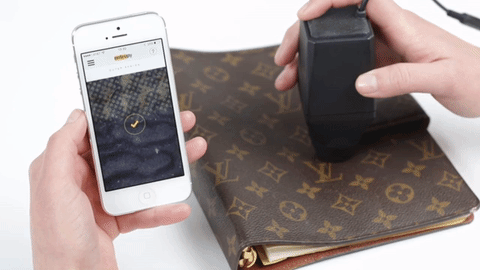When you’re buying something expensive, you want it, first and foremost, to be real.
“Trust is really the problem we’re solving,” Vidyuth Srinivasan said. He’s the cofounder and CEO of Entrupy, a Dumbo company attempting to rid the world of fugazis using the power of machine learning. After three years of testing, the company launched its product publicly this week.

Entrupy created essentially a handheld smart microscope which scans the material of designer bags down to a structural level. The scanner then connects via an app to Entrupy’s enormous database of bag scans, and determines if the scan is a fit.
“Counterfeiting is an unsexy theme where every single supply chain in every high-value industry goes through this problem, beyond manufacturing and retailing, but even reselling,” Srinivasan said. “Pharmaceuticals, kids toys, these can even kill people. People don’t have a good way of instantly identifying fakes. We said, ‘What if we could build one global solution?'”
But a global solution is labor intensive. For each make and model of material, Entrupy has to have enough samples from real versions of the product to be able to build a reliable model for what they should look like.
Srinivasan said it takes about 150 samples to get to 96 percent accuracy and then each additional sample increases the accuracy of the test marginally. On the makes and models Entrupy works with now, which is primarily Louis Vuitton and Hermes products, the accuracy is above 99 percent. The company’s entire database contains over 4 million samples. That requires a team of about 10 people in different marketplaces all over the country. Entrupy has partnered with these retailers and resellers to collect the samples that build the database.
The company opened up to sales this week and business has been brisk, Srinivasan said. Entrupy sells the handheld units for $450, and then there’s a tiered subscription model for use of the database. The rush of sales is super encouraging for Srinivasan, who’s been working on the project, which almost didn’t get made, for years.

Originally, the product was going to be for verifying the legitimacy of high-end art. But try as the team might, it was just too hard to get a good accuracy with the database. So they switched over to designer bags and it’s been much more successful. But the company doesn’t want to stop at luxury goods. Srinivasan sees the potential use for Entrupy in all kinds of markets.
“Long-term, [we’d like to] become part of every transaction of physical goods where there’s a trust deficit,” he said. “I believe we can do it because it’s only a question of how quickly we can build partnerships and globally scale.”
Counterfeit-spotting truth machine launches out of Dumbo







